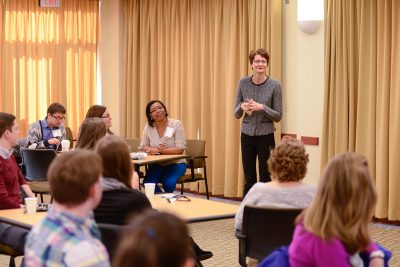Faculty in the Neag School teacher education program this March brought together more than 70 people — from current students and alumni to local educators and school administrators — for an interactive discussion focused on the theme of “Teaching in Turbulent Times.” Prompted by ongoing discussion in recent months among faculty and educators about political divides surfacing in today’s classrooms, the event — led by Dorothea Anagnostopoulos, executive director of teacher education at the Neag School — was intended to serve as an opportunity for a diverse range of people in the education field to network and speak openly, offering suggestions and concerns.
Current students, practicing teachers, faculty, and local administrators alike, Anagnostopoulos says, have in recent months been raising questions about how to confront challenges within the classroom that have stemmed from the recent contentious presidential election campaign, the education policies currently being put in place by the Trump administration, as well as the larger movement of ethnonationalism across the U.S. and Europe.
“This is a moment where we can actually work together and create bridges amongst ourselves — and also with our students.” — Dorothea Anagnostopoulos, executive director, teacher education
Educators play an important role in students’ understanding of what it means to become active and informed citizens, Anagnostopoulos says. For example, she says, recent events have “raised critical questions about how we can find ways to support students who have been victimized and to educate students on hate crimes.” Teachers, she adds, may not always know how to address these kinds of issues with students in their classroom. This is what spurred the idea for a two-way conversation that addresses the needs of current and future educators and school administrators.
“This is a moment where we can actually work together and create bridges amongst ourselves — and also with our students,” Anagnostopoulos says.
“Teachers have started to voice concerns about these types of issues,” says Kelly Lyman, superintendent of Mansfield Public Schools and an adjunct faculty member of the UConn Administrator Preparation Program, who attended the March 6 event on the UConn Storrs campus. “This is an important time for finding safe spaces for others to have conversations.”
“My district is quite diverse, and the immigrant population makes up the fabric of who we are as a school community,” adds Vonetta Romeo-Rivers, director of Talent Development for Manchester Public Schools. “We started having these conversations, but they are tough to have in a professional space. If we can’t do it … ourselves, we can’t help our students.”
Anagnostopoulos kicked the event off, followed by remarks from Parag Joshi, a history teacher at Manchester High School, and Neag School assistant professor Glenn Mitoma, who serves as director of UConn’s Dodd Center. Each speaker highlighted educators’ rights and responsibilities in the current policy setting. During the latter half of the evening, attendees split into groups to discuss questions raised by faculty.
Neag School assistant professor Rachael Gabriel called it a “nice balance of sharing resources and also speaking and connecting.”
“The goal with a roundtable discussion is that it’s a structural symbol of equal participation, which is helpful for people who don’t know each other,” she says. “I’m really conscious of the idea that we are preparing future educators, but also that we have a responsibility to current teachers. We don’t have a lot of answers right now, which is why we feel that more of a connection is needed.”
Topics of conversation included the responsibilities of current and future educators toward undocumented, refugee, and immigrant students; ways to help students navigate fake news; and available resources to help students with these issues.
“I hope there will continue to be events like this so that people will feel less isolated,” says Teresa Bulanda, a math teacher at Classical Magnet School in Hartford.
Neag School associate professor-in-residence Eliana Rojas says she also found the dialogue led by teachers and the schools “inspiring.”
“After this type of event, it makes it very energizing and positive to work in this environment,” she says.



